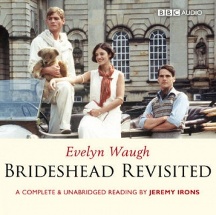Brideshead revisited by Evelyn Waugh (Audio book)

BBC Audio, 2002. Read by Jeremy Irons. 11 hours, 20 mins (10 CDs).
Evelyn Waugh, 1945.
(Ages: 15+) Family and relationships. Anyone who has seen the
excellent television series of this well known book will love this
audio version read by Jeremy Irons. Driving to Canberra last month
his voice filled our car and it was like watching the BBC series all
over again. And we had lots to discuss. The story of Charles Ryder's
infatuation with the Flyte family reflects the disillusionment of
many who have found that what they loved was not what they thought.
Charles is seduced by Sebastian's life of luxury and ease when he
meets him at Oxford in the 1920's. But as Charles becomes more
involved with the family, Sebastian's health deteriorates and his
dependence upon alcohol becomes apparent. Charles is asked by Lady
Flyte to spy upon her son and when he fails to do this, he is
dismissed, and Sebastian banished abroad.
Years later, Charles meets Sebastian's sister, Julia and they become
lovers, Charles moving into the Flyte mansion. Here he is confronted
yet again with their religion and its hold upon the members of the
Flyte family. His love for Julia is compromised by her religion,
especially after the death of her father.
The Catholic religion stamps the behavior of the whole Flyte family,
several members constrained with guilt, and this underline much of
their behaviour towards each other. Despite Sebastian, his father
and Julia separating themselves from it, they all come back to it in
the end. Charles cannot understand this at all, and it is this
argument which finally separates him from Julia, causing the pair
the greatest unhappiness. Each of the characters is selfish, from
Charles' mother going off to the Spanish Civil War, leaving her
husband and infant son, or Charles later leaving his wife and
children to live with Julia, or Lord Flyte leaving his family to
live in Italy with his lover, all are selfish, and despite our
approbation, have qualities we can admire.
It is a wonderful book, audio tape and TV series, and one which
could be paired with many novels which deal with the effect religion
has on a family, or could be compared with The Great Gatsby,
for example, showing a person being overwhelmed by someone else's
wealth and generosity. As a study of life between the wars, too, it
is redolent of the luxury and ease of some classes of people, and
again, the theme of the loss of innocence, and the agony of
disillusionment, comes through it all.
Fran Knight